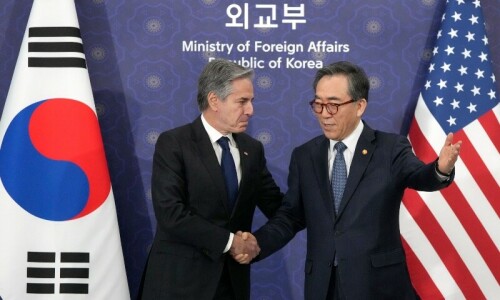BELGRADE: There is no mistaking the Serbian nationalist message of the train, from the Orthodox icons adorning its interior to the bold claim plastered across its exterior in a host of languages: “Kosovo is Serbia”.
On Saturday the train got its message moving, initiating the first rail service from Belgrade to the mostly ethnic Serbian north of Kosovo since the outset of the war 18 years ago that split the nations apart.
Serbian authorities claim the renewed rail service answers a clear need, allowing the majority Serbian population in Kosovo’s north “to have better communication with central Serbia”, according to Marko Djuric, Serbian minister for Kosovo affairs.
“Who has the right to call for the violation of a fundamental right — that of free movement?” Djuric said at the central Belgrade train station from where the train was leaving.
But Pristina has denounced it as a “serious provocation” challenging Kosovo’s territorial sovereignty.
“The introduction of an illegal rail service represents interference which threatens our sovereignty and proves Serbia is seeking to destabilise Kosovo,” said Edita Tahiri, who leads Kosovo’s negotiating team with Belgrade.
Because the central Kosovo government has no real control over the predominantly ethnic Serb north and that region’s borders with Serbia, it has appealed to the European Union to “stop this illegal train”.
The train, painted in the red, blue and white of the Serbian flag, is decorated with replicas of religious icons from Serbian Orthodox monasteries located in Kosovo.
Although most of Kosovo is ethnic Albanian, many Serbs consider it their native homeland, and despite Kosovo’s unilateral declaration of independence in 2008, Serbia — and its ally Russia — have yet to recognise its sovereignty.
Some 13,000 people were killed in the 1998-1999 war. A European-Union brokered agreement was reached in 2013 to “normalise” relations between Belgrade and Pristina.
Published in Dawn, January 15th, 2017









































Dear visitor, the comments section is undergoing an overhaul and will return soon.